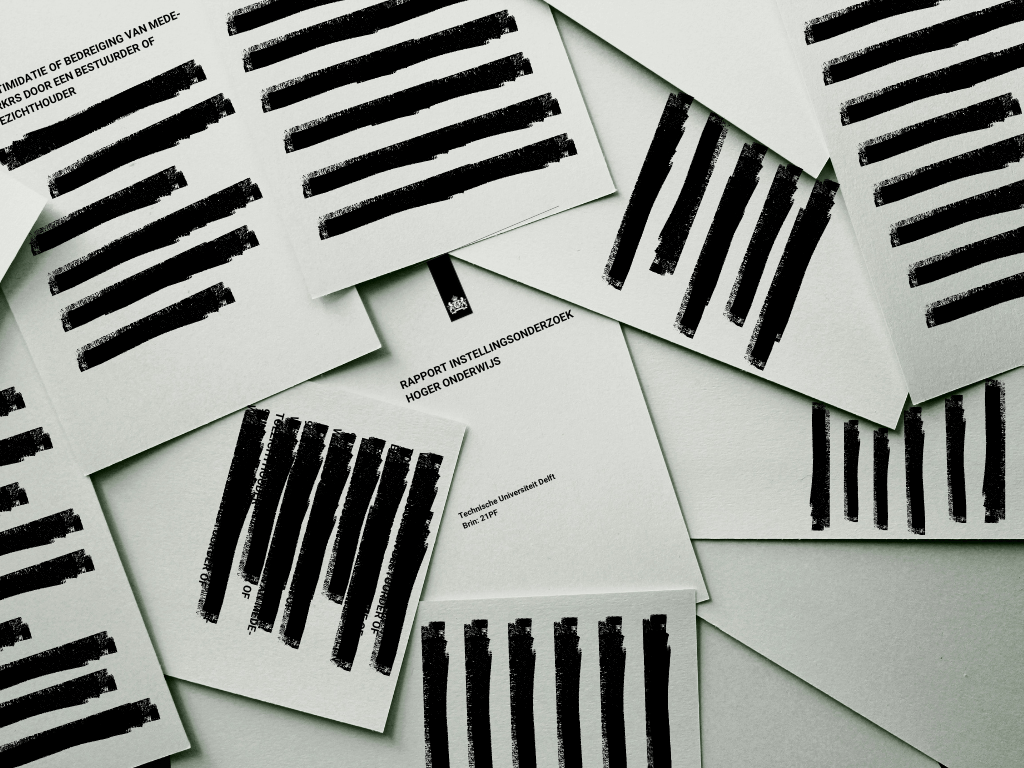TU Delft accidentally put confidential information online while defending itself against the Inspectorate of Education’s report. Passages that had been blacked out were still legible. These passages suggest that TU Delft is mostly fearful about damage to the reputation of its administrators.
(Photo: Brandi Redd / Unsplash, bewerking: Marjolein van der Veldt)
‘The expected draft report will receive plenty of attention from the media, opinion makers and politics’, writes TU Delft in the first blacked out passage. ‘Making these factually incorrect and unjustified findings and conclusions public will bring unprecedented disproportionate and unnecessary damage to TU Delft, particular groups of employees and its individual staff members.’
TU Delft itself made a report from the Inspectorate of Education public on Friday 1 March. After an investigation lasting more than 10 months, the Inspectorate concluded that TU Delft had so severely neglected its duty of care for the social safety of its staff that this has culminated in ‘mismanagement’. This is the worst possible Inspectorate conclusion.
The Executive Board and the Supervisory Board are also criticised in the report. Current and former Executive Board members are alleged to have brought about ‘more experiences of unsafe incidents’ and the Supervisory Board is alleged to ‘not sufficiently improve the social safety of staff members’.
Simultaneous to the report being made public, TU Delft published its response to the draft report that the Inspectorate sent it in November. Various ‘strictly confidential organisational information’ passages in the document had been blacked out, but had not been done so properly. Acting upon a tip, Delta was able to read these passages. As some of the blacked out sections are about specific staff members, Delta opted not to publish them.
Reputation damage for administrators
In the deleted sections, the university seems more concerned with the fate of administrators than that of employees. Eight of the blackened out passages refer to the ‘factually incorrect and unjustified findings and conclusions’ of the Inspectorate that could lead to reputation damage for administrators. Concerns about damage to TU Delft staff members or groups of staff members are lower at 6 times. The concern about general reputational damage, such as to TU Delft as a whole, is stated 10 times.
‘This was not the intention’
Many of the blacked out passages concern advice from a communications agency called Confidant Partners. It appears that TU Delft had asked this agency to analyse the draft report from the perspective of reputation. Among its conclusions, Confidant Partners writes: ‘The media regularly labels the lack of social safety as ‘transgressive behaviour’. The associated unavoidable damage to reputation always applies to the organisation itself, and often to the people involved, many of whom are administrators.’
Warning to the Inspectorate
TU Delft believes that chapter nine calls for particular attention because it may lead to the Executive Board and the Supervisory Board having to step down. This chapter covers assumed intimidation and threats by current and/or former administrators or supervisors. ‘The consequence of publishing a chapter like this can only lead to the relevant administrators and supervisors publicly disputing this or stepping down (forcibly or otherwise) as they are unable to defend themselves’, writes TU Delft. TU Delft says that the Inspectorate ‘has absolutely no proof, substantiated claims or context’ for the ‘extremely severe allegation’.
The tone of the blacked out sections of text is often irritated or accusatory. TU Delft thus warns the Inspectorate that – should its administrators have to defend themselves publicly – it will not get away without damage itself. ‘This will have unavoidable consequences for the reputation of TU Delft (and for the Inspectorate too, but that aside).’
Regrettable
A TU Delft spokesperson calls the leaking of the sensitive parts of the text ‘regrettable’. “This was not the intention,” he says. “As soon as we found out, we took action.” The spokesperson says that the fear of reputational damage is not the reason that TU Delft opted to publish the report itself. “The issue is that the Inspectorate draws very severe conclusions, such as mismanagement, that are based on improper investigation. We did not want the employees to read about this in the newspaper.”
While TU Delft expresses its concerns for the reputation damage to the administrators more often than for its employees, the spokesperson says that it is not the case that TU Delft attaches greater value to the interests of administrators. “We care equally about all staff members at TU Delft.”
- Delta is looking for current and former TU Delft employees who are willing to share their experiences. This can be done anonymously if preferred. Email tudelta@protonmail.com.
Do you have a question or comment about this article?
a.m.debruijn@tudelft.nl


Comments are closed.